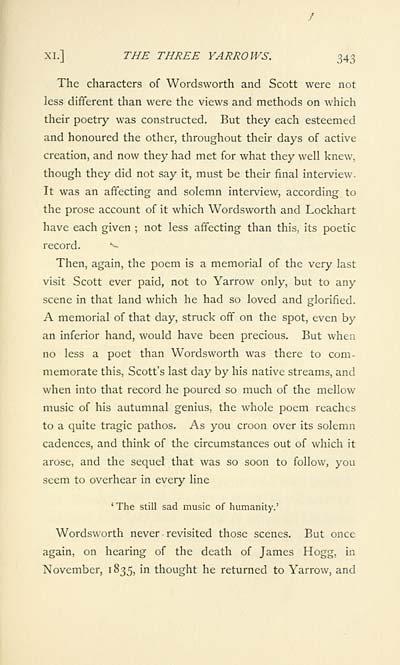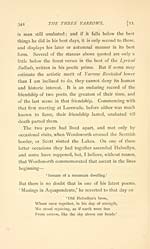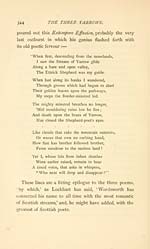Ossian Collection > Aspects of poetry
(359)
Download files
Complete book:
Individual page:
Thumbnail gallery: Grid view | List view

XI.] THE THREE YARROWS. 343
The characters of Wordsworth and Scott were not
less different than were the views and methods on which
their poetry was constructed. But they each esteemed
and honoured the other, throughout their days of active
creation, and now they had met for what they well knew,
though they did not say it, must be their final interview.
It was an affecting and solemn interview, according to
the prose account of it which Wordsworth and Lockhart
have each given ; not less affecting than this, its poetic
record. ^
Then, again, the poem is a memorial of the very last
visit Scott ever paid, not to Yarrow only, but to any
scene in that land which he had so loved and glorified.
A memorial of that day, struck off on the spot, even by
an inferior hand, would have been precious. But when
no less a poet than Wordsworth was there to com-
memorate this, Scott's last day by his native streams, and
when into that record he poured so much of the mellow
music of his autumnal genius, the whole poem reaches
to a quite tragic pathos. As you croon over its solemn
cadences, and think of the circumstances out of which it
arose, and the sequel that was so soon to follow, you
seem to overhear in every line
' The still sad music of humanity.'
Wordsworth never revisited those scenes. But once
again, on hearing of the death of James Hogg, in
November, 1835, in thought he returned to Yarrow, and
The characters of Wordsworth and Scott were not
less different than were the views and methods on which
their poetry was constructed. But they each esteemed
and honoured the other, throughout their days of active
creation, and now they had met for what they well knew,
though they did not say it, must be their final interview.
It was an affecting and solemn interview, according to
the prose account of it which Wordsworth and Lockhart
have each given ; not less affecting than this, its poetic
record. ^
Then, again, the poem is a memorial of the very last
visit Scott ever paid, not to Yarrow only, but to any
scene in that land which he had so loved and glorified.
A memorial of that day, struck off on the spot, even by
an inferior hand, would have been precious. But when
no less a poet than Wordsworth was there to com-
memorate this, Scott's last day by his native streams, and
when into that record he poured so much of the mellow
music of his autumnal genius, the whole poem reaches
to a quite tragic pathos. As you croon over its solemn
cadences, and think of the circumstances out of which it
arose, and the sequel that was so soon to follow, you
seem to overhear in every line
' The still sad music of humanity.'
Wordsworth never revisited those scenes. But once
again, on hearing of the death of James Hogg, in
November, 1835, in thought he returned to Yarrow, and
Set display mode to: Large image | Transcription
Images and transcriptions on this page, including medium image downloads, may be used under the Creative Commons Attribution 4.0 International Licence unless otherwise stated. ![]()
| Early Gaelic Book Collections > Ossian Collection > Aspects of poetry > (359) |
|---|
| Permanent URL | https://digital.nls.uk/78389580 |
|---|
| Description | Selected books from the Ossian Collection of 327 volumes, originally assembled by J. Norman Methven of Perth. Different editions and translations of James MacPherson's epic poem 'Ossian', some with a map of the 'Kingdom of Connor'. Also secondary material relating to Ossianic poetry and the Ossian controversy. |
|---|
| Description | Selected items from five 'Special and Named Printed Collections'. Includes books in Gaelic and other Celtic languages, works about the Gaels, their languages, literature, culture and history. |
|---|

